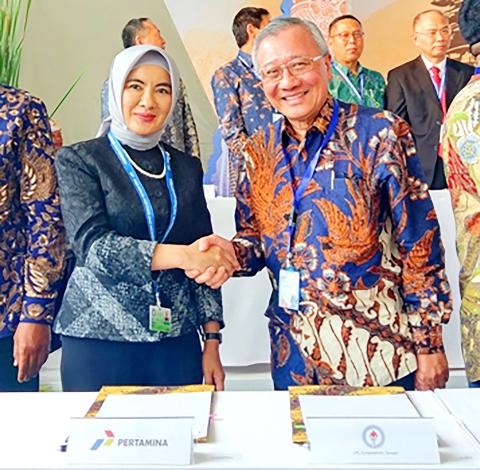CPC Corp, Taiwan (台灣中油) chairman Tai Chein (戴謙) yesterday confirmed that the company has inked an agreement with the Indonesian government to build a naphtha cracker in the country, marking a milestone in the government’s New Southbound Policy.
While the investment was reported as early as last week during Indonesia’s infrastructure forum alongside the IMF and the World Bank annual meetings in Bali, Tai said that CPC had kept silent to prevent Chinese interference.
The state-run refiner has inked a memorandum of understanding with PT Pertamina, its Indonesian counterpart, to invest NT$200 billion (US$6.47 billion) in the project, Tai said.

Photo: CNA
CPC and Pertamina would each take a 45 percent stake in the plant, with the remaining 10 percent earmarked for Taiwanese and foreign petrochemical investors, Tai said.
CPC has begun feasibility studies and assessing five sites proposed by the Indonesian government for the project, Tai said, adding that its investment plans would begin to take shape in the middle of next year.
The project is expected to produce nearly 1 million tonnes of ethylene annually and meet the demands of Indonesia’s population of 261 million.
The project would also benefit from Indonesia’s incentive package for petrochemical investments, which waives all corporate income taxes for the first 20 years, followed by a 50 percent tax cut the next two years, CPC said.
Meanwhile, Tai said that CPC’s decision to freeze fuel prices until the end of this year was not politically motivated.
The company’s mission is to ensure the people’s livelihood, support industry and maintain the nation’s strategic fuel reserves, not to make a profit, he said.
The company, which recorded NT$45.6 billion in pre-tax profits between January and last month, is fully prepared to absorb impacts stemming from its price freeze, given rising global oil prices, Tai said.
“CPC would be able to meet the government’s minimum annual earnings requirement of NT$12 billion,” Tai said during a radio interview yesterday. “Estimates show that the company can absorb anticipated losses in the final quarter.”
The price freeze was decided by the company, and no instructions were given by the Executive Yuan, Tai said, adding that lawmakers would decide if CPC could extend the price freeze through next year.
Minister of Economic Affairs Shen Jong-chin (沈榮津) during a question-and-answer session at the Legislative Yuan yesterday said that the price freeze could lead to NT$8 billion in losses for CPC in the final quarter.

MORE VISITORS: The Tourism Administration said that it is seeing positive prospects in its efforts to expand the tourism market in North America and Europe Taiwan has been ranked as the cheapest place in the world to travel to this year, based on a list recommended by NerdWallet. The San Francisco-based personal finance company said that Taiwan topped the list of 16 nations it chose for budget travelers because US tourists do not need visas and travelers can easily have a good meal for less than US$10. A bus ride in Taipei costs just under US$0.50, while subway rides start at US$0.60, the firm said, adding that public transportation in Taiwan is easy to navigate. The firm also called Taiwan a “food lover’s paradise,” citing inexpensive breakfast stalls

TRADE: A mandatory declaration of origin for manufactured goods bound for the US is to take effect on May 7 to block China from exploiting Taiwan’s trade channels All products manufactured in Taiwan and exported to the US must include a signed declaration of origin starting on May 7, the Bureau of Foreign Trade announced yesterday. US President Donald Trump on April 2 imposed a 32 percent tariff on imports from Taiwan, but one week later announced a 90-day pause on its implementation. However, a universal 10 percent tariff was immediately applied to most imports from around the world. On April 12, the Trump administration further exempted computers, smartphones and semiconductors from the new tariffs. In response, President William Lai’s (賴清德) administration has introduced a series of countermeasures to support affected

CROSS-STRAIT: The vast majority of Taiwanese support maintaining the ‘status quo,’ while concern is rising about Beijing’s influence operations More than eight out of 10 Taiwanese reject Beijing’s “one country, two systems” framework for cross-strait relations, according to a survey released by the Mainland Affairs Council (MAC) on Thursday. The MAC’s latest quarterly survey found that 84.4 percent of respondents opposed Beijing’s “one country, two systems” formula for handling cross-strait relations — a figure consistent with past polling. Over the past three years, opposition to the framework has remained high, ranging from a low of 83.6 percent in April 2023 to a peak of 89.6 percent in April last year. In the most recent poll, 82.5 percent also rejected China’s

PLUGGING HOLES: The amendments would bring the legislation in line with systems found in other countries such as Japan and the US, Legislator Chen Kuan-ting said Democratic Progressive Party (DPP) Legislator Chen Kuan-ting (陳冠廷) has proposed amending national security legislation amid a spate of espionage cases. Potential gaps in security vetting procedures for personnel with access to sensitive information prompted him to propose the amendments, which would introduce changes to Article 14 of the Classified National Security Information Protection Act (國家機密保護法), Chen said yesterday. The proposal, which aims to enhance interagency vetting procedures and reduce the risk of classified information leaks, would establish a comprehensive security clearance system in Taiwan, he said. The amendment would require character and loyalty checks for civil servants and intelligence personnel prior to